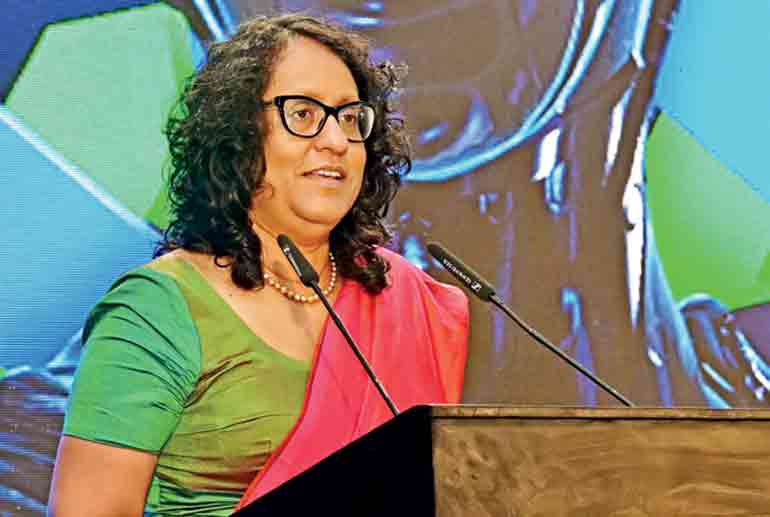Monday Feb 16, 2026
Monday Feb 16, 2026
Tuesday, 30 September 2025 02:31 - - {{hitsCtrl.values.hits}}

Prime Minister Dr. Harini Amarasuriya
By Charumini de Silva
Sri Lanka yesterday signalled its intent to position itself as a regional leader in the digital economy, with Prime Minister Dr. Harini Amarasuriya unveiling a sweeping package of education reforms, policy initiatives, and investment opportunities at the first-ever National AI Expo and Conference 2025.
From embedding Artificial Intelligence (AI), robotics, and climate science into school curricula and upskilling 100,000 teachers, to launching a unified cybersecurity strategy, digital payment systems, and a national AI platform, the Government pledged to align human capital development with economic modernisation.
Stressing that public-private partnerships (PPPs) would be central, Dr. Amarasuriya said the National AI Expo and Conference marks a “paradigm shift” that will connect Sri Lankan startups with global technology leaders, improve productivity, reduce costs, and open new markets, while ensuring inclusivity and ethical use of AI.
She declared that AI is no longer a distant technology, but a force already shaping lives and choices.
Dr. Amarasuriya also positioned AI as the backbone of a national strategy linking education reforms, startup ecosystems, cybersecurity, and PPPs, declaring that “Sri Lanka is ready to participate in the global digital economy.”
“AI is not only a technology of the future. It is already influencing the choices we make today,” the Prime Minister said, describing the Expo as both a showcase of technology and a statement of intent.
She stressed that AI must be understood not just in terms of capability, but in how it serves society. “Our challenge is not only to ask what AI can do, but how we want it to shape our society.”
Outlining the Government’s digital agenda, Dr. Amarasuriya announced that by 2030, Sri Lanka aims to expand its digital economy to $ 15 billion, representing 12% of GDP, with $ 5 billion in digital exports and a workforce of 200,000 skilled professionals.
“By doing so, we send a clear message: Sri Lanka is ready to participate in the global digital economy,” she declared.
She highlighted a series of initiatives to unify the country’s digital transformation, including the National Cybersecurity Strategy, an AI platform and expanded digital payment systems, which Dr. Amarasuriya said would replace fragmented efforts with a coherent national framework.
“These initiatives will prepare every school, every university, every business, and every citizen for the future.”
Dr. Amarasuriya, who also serves as the Education Minister, placed strong emphasis on human capital. “Without human capacity, technology remains only potential,” she cautioned.
She said the Government is embedding digital literacy, coding, AI, robotics, and climate science from early grades, while rolling out competency-based education reforms and equipping schools with smart classrooms and devices.
The Prime Minister also announced a Teacher Excellence Framework is being introduced to upskill 100,000 educators, alongside a National Digital ID system for the education sector. At the university level, she said curricula are being restructured to align with industry needs, producing not just employees but “innovators and entrepreneurs.”
“Initiatives such as inventor clubs, vocational platforms from grade nine, and a National Skills Passport are expected to bridge the gap between students and future careers,” she added.
Dr. Amarasuriya also underscored the importance of building the right economic environment.
“We are expanding digital transport and payments systems via our national platform ‘GovPay,’ and strengthening cybersecurity through a national operations centre to ensure safety and trust in the digital marketplace.”
She said the Government is committed to PPPs, recognising that the public sector alone cannot drive this transformation.
“The private sector brings agility, innovation, and investment, while the Government provides policy stability, infrastructure, and inclusivity. Together, we can achieve far more than either can alone,” she stressed.
From an economic perspective, Dr. Amarasuriya said the National AI Expo and Conference is a marketplace of ideas and solutions.
“It connects Sri Lankan businesses with global technology leaders, showcases local startups to investors, and demonstrates how AI can improve productivity, reduce costs, and open new markets.”
The Prime Minister emphasised that AI could add 10-12% of digital economy growth by 2030, but only if adopted responsibly. “It will only happen if we integrate AI with governance frameworks, ethical guidelines, and a focus on inclusivity.”
Calling the Expo “a living classroom,” she said it brought students, teachers, and academics face-to-face with AI technologies and ethical debates. “It inspires young people to see themselves not only as consumers of technology but as creators, researchers, and entrepreneurs.”
She said the Expo would move beyond Colombo to regional centres, ensuring adoption across the country, and would eventually evolve into an international platform, attracting South Asian and global participants.
“Sri Lanka must be recognised not only as a consumer of technology, but as a producer of AI talent, research, and education.”
In a personal reflection, Dr. Amarasuriya admitted she has long been a “sceptical adopter” of technology.
“But I think having sceptics like us is important, because we insist that technology must be used for solving human problems, not just as a fashion or trend. Education in technology must go hand in hand with educating people about humanity, ethics, and responsibility,” she explained.
In a call for unity in the digital transition, the Prime Minister said: “By 2030, when we look back, let us be able to say with pride that we built a digital Sri Lanka that left no one behind. Our goal is simple: a digital Sri Lanka where opportunities go beyond privilege and become rights.”
The National AI Expo and Conference, she said, would serve as the cornerstone of that vision; “a paradigm shift where every community, entrepreneur, and young mind recognises its value and has a stake in the country’s digital transformation.” (CdeS)